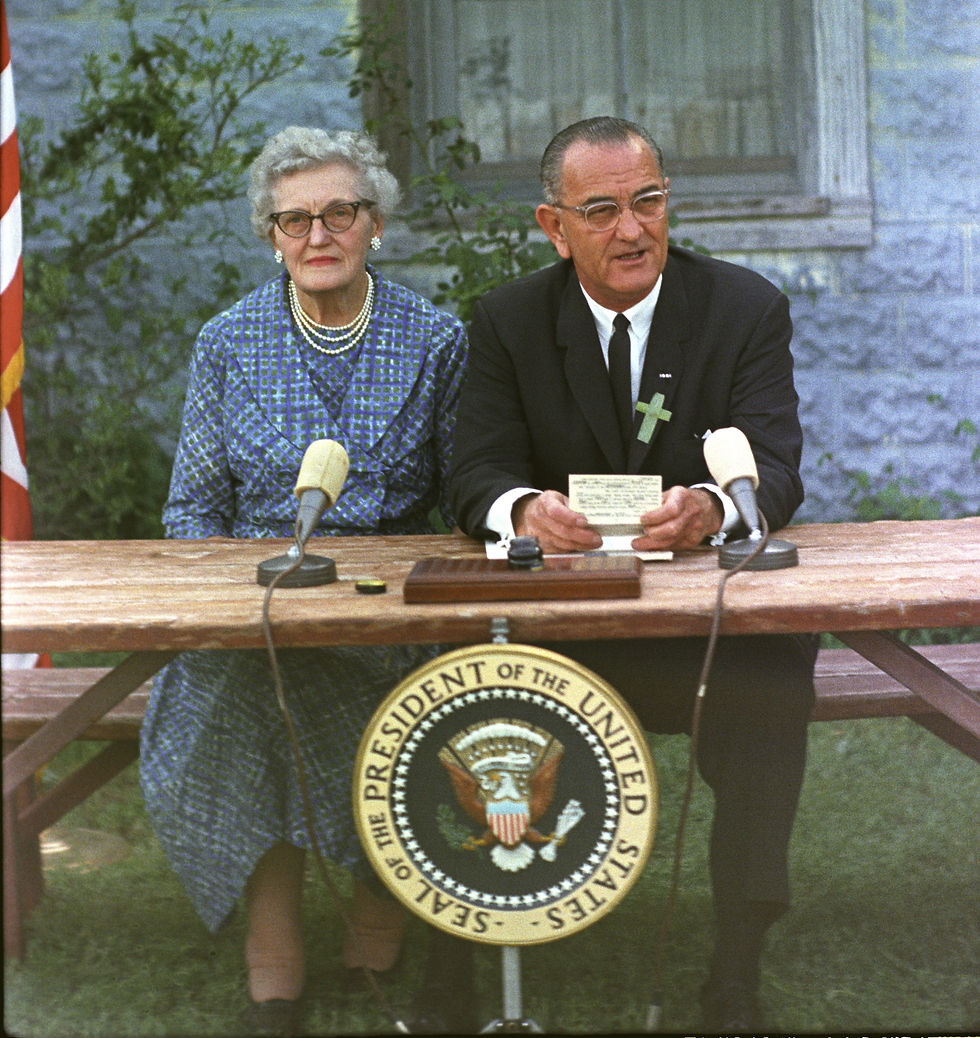Freewheeling Blog: A Sermon Fit for a President
- cecil2748
- Jul 27, 2024
- 3 min read
Updated: Aug 2, 2024

The Palm Sunday service was underway at First Methodist Church of Johnson City, Texas, on April 11, 1965 when President Lyndon Johnson and his wife Lady Bird slipped late into a pew, accompanied by Secret Service agents. My father, Carl Taylor, was the minister. That day, he delivered a sermon that resonated beyond the church walls into the historic bill signing that took place later that day.
Recently I went searching for that sermon in my father's archives. As I read through it, I was struck not only by the meaningful nature of his sermon, but its serendipitous alignment with the signing of the Elementary and Secondary Education Act of 1965 that afternoon.
Not that my father knew that LBJ was coming. If the president was in town and attending church, it was typically at his home church and not at the Methodist church. But occasionally Johnson did visit other churches, so my dad had told himself that if LBJ ever showed up when he was preaching, he would simply stay the course and deliver what he had prepared.
I share with you my father's words, but I wish I had a recording. A speech and drama major in college, my father delivered sermons with a powerful voice full of inflection. I always wished I had inherited his voice. I can only imagine in my mind's eye and ear how he sounded as he preached to the congregation and the president of the United States.
For his Palm Sunday sermon, young Carl first set the scene for Jesus's triumphant entry into Jerusalem with a preview he returned to later.
When the winding road crept round the shoulder of Olivet, the city suddenly came into view, and Jesus halted. They saw him sitting there, silent, and absorbed. And then - to their amazement - they saw tears in his eyes! Jesus wept! The people could not understand - how could they know he was weeping for the stubbornness, the blindness, of the city he loved.
My dad went on to speak about the stops Jesus made in Jerusalem and the symbolism of each. He started with the colt that Jesus rode.
Let the beast stand as a modest representative of material values in the world. The Lord has need of them all. His purpose for us can only be achieved as these materials - the mines and farms, the shops and factories, the trucks and railroads - are yielded to the mastery of his spirit and administered for the high ends of human well-being which he held steadily in view.
The sequence went on, as Carl listed Jesus's visits to the places of government, worship, teaching, and the home (Lazarus, Mary and Martha's home in Bethany). My dad described each as symbolic of Jesus's kingly rule over them.
Toward the end of the sermon, my father reminded us that Jesus looks upon us now as he looked upon Jerusalem before entering.
What does he think of us? He looks upon our business; he looks upon our temples; he looks upon our politics; he looks upon our schools; he looks upon our homes. Is he weeping? Master, King, art Thou weeping over us?
The service included a song by my elementary choir. The president found us afterward, going down the line to shake each hand and express his appreciation.
Perhaps we children reflected his own elementary years. Afterward, LBJ headed toward the site of his former elementary school, accompanied by his grade school teacher, Kate Deadrich Loney. There he signed the Elementary and Secondary Education Act, landmark legislation specifically authorizing the federal government to equalize educational opportunities of all children by directing federal education dollars to the most disadvantaged children living in poverty. My father's points about Christ holding mastery of our governing and our teaching echoed in the signing of that legislation.
Take another look at Pres. Johnson's picture. On LBJ's lapel is a Palm Sunday cross he pinned on at our church. Jesus's Palm Sunday trek toward the cross was represented at this moment of caring for the least of these. Perhaps on this day, Jesus did not have to weep over us so much.



Comments